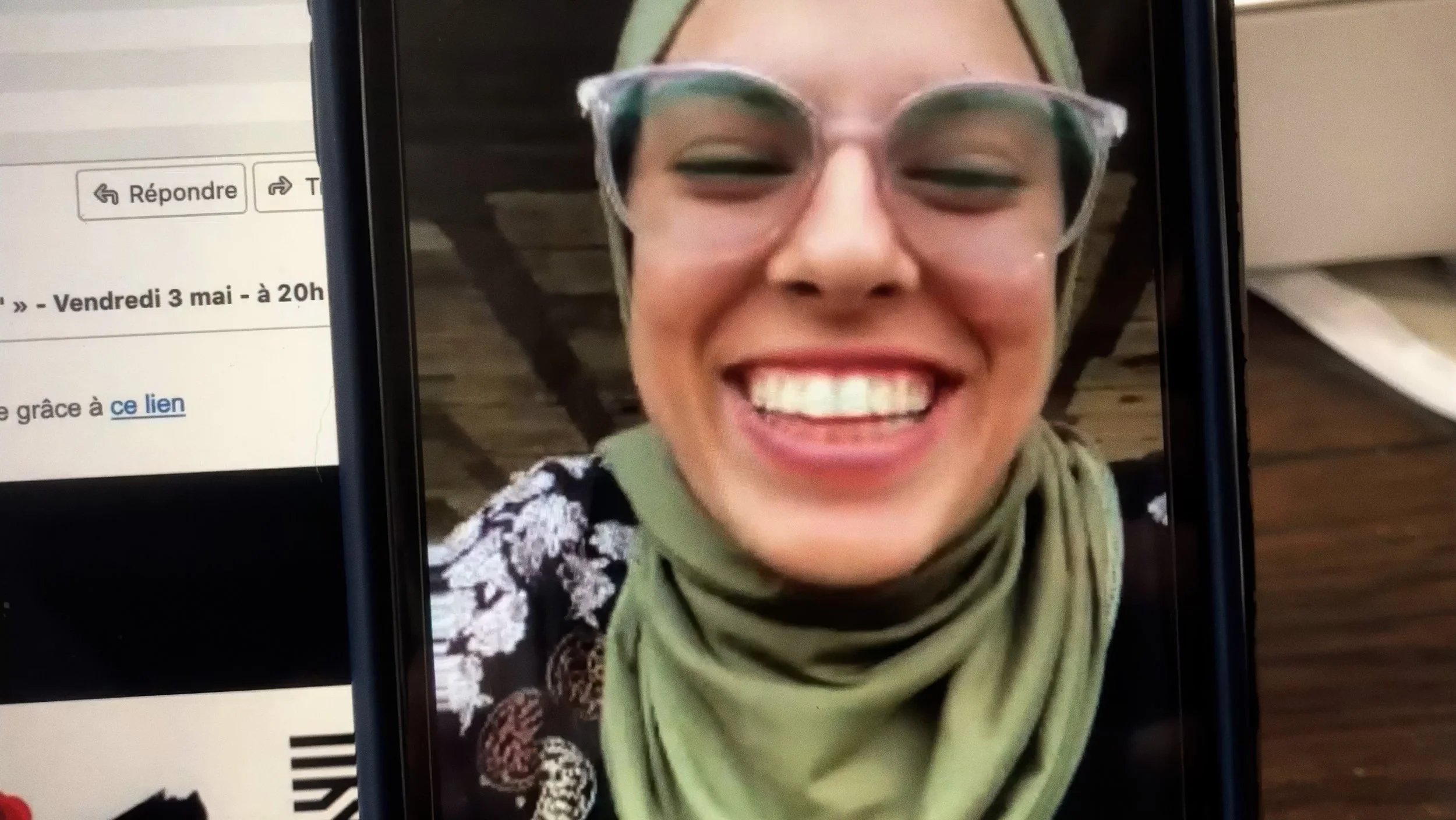Put Your Soul On Your Hand and Walk: Seeking Life Amid Gaza’s Ruins
By Liam Lacey
Rating: A
Both a film and an obituary, Put Your Soul on Your Hand and Walk, is a dark, unique document of the Gaza war focusing on a 25-year-old Palestinian photojournalist and poet, Fatma Hassona (sometimes spelled Fatima Hassouna).
Hassona, a university graduate of multimedia studies, lived with her family and took digital photos of daily life around the ruins of her North Gaza neighbourhood, including children playing in the rubble.
“I’m trying to find some life in this dead,” she says in her imperfect English.
Last April, the film, based around a series of video phone conversations between Hassona and director Sepideh Farsi, was accepted for a sidebar program at the 2025 Cannes film festival. A day later, Hassona was killed, along with several members of her family, by an Israeli missile that struck their apartment as they were sleeping.
In the weeks between Hassona’s death and the Cannes debut, the director re-edited the film’s ending in a way that still focuses on Hassona’s resilience, but recasts it in a shadow of grief. Some reviewers have found the film inspiring and empathetic. I found it depressing, which is still a tribute to its emotional impact.
Farsi, an Iranian exile filmmaker living in Paris (she made the 2023 animated drama, The Siren) had been frustrated by the lack of Palestinian perspective in the months of the war following the Hamas’ massacres and kidnappings of Oct. 7. The Israeli Defence Forces refused to allow foreign journalists to enter Gaza except under strict supervision as the Palestinian death toll escalated into the tens of thousands.
Through Palestinian refugees she met in Cairo, she was virtually introduced to Hassona. Because the director was unable to enter Gaza, and Hassona was unable to leave, they communicated through video calls.
There is a stealthy artfulness to the way Farsi turns practical difficulties into a potent lo-fi aesthetic, as the two women, a generation apart, speak in awkward English through bad internet connections. Farsi used one iPhone to record the video on another phone, often to the rumble of Israeli Apache helicopters. The fragmented calls are interspersed with grainy clips of war coverage, television broadcasts on her laptop (CNN, Al Jazeera, France 24), and images of Hassona’s carefully composed digital photos of Palestinian men, women and children, against the backdrop of their city’s broken buildings and mounds of grey rubble.
Hassona is an immensely endearing screen presence. Wearing various coloured head scarves, sometimes with glasses on, sometimes not, she smiles broadly and responds to each phone call with an enthusiastic “I’m good! I’m fine!” and is almost giddily positive during many of these conversations. At least that’s true in the first few months, though depression begins to weigh on her as food, water and electricity runs short, and the death count increases.
“You have many different options to die here in Gaza,” she says. At one point, she relates how her uncle’s wife’s head was found in an adjacent street. Each time she leaves her family apartment to shoot images in the street, she knows she is at risk: In a phrase that gives the movie its title, she says: “'When you take photos here, you have to put your soul on your hands and walk.”
The last time we see Hassona is when she is told that the film we are watching will be shown at the Cannes film festival. Will Hassona attend? “Of course!” she says with delight, though she says she will not leave Gaza for good. They make arrangements for Hassona to send a copy of her passport to Farsi.
Then the screen turns to black and post-credits tell us that the day after, Hassona and her family were killed. While the film credits do not say it explicitly, as Farsi has said in interviews, it appears that Hassona’s death was a targeted assassination by the Israeli Defense Forces.
Instead the film cites the United Nations Human Rights Office in the occupied Palestinian Territory (OHCHR) which has “confirmed the killing of 211 journalists in Gaza since Oct. 7, 2023, including 28 women journalists.” That claim, for the record, is substantiated by other monitoring agencies, including Reporters Without Borders, The Committee to Protect Journalists, The International Federation of Journalists, and the Cost of War Project out of Brown University, which describes the Gaza War as the worst conflict on the historical record for the deaths of journalists and media workers.
Though it’s not part of the film, an investigation by Forensics Architecture, a research agency based in Goldsmiths University of London, established that the the Hassona home on the second floor was targeted, using two missiles dropped by a drone, with a delay fuse to detonate at her family’s second floor level and the floor below it.
They killed Hassona, her pregnant sister and three brothers, and the father later died of his wounds. The IDF did not deny the missile strike, but says it targeted a Hamas militant at that location.
In the film Hassona hopes for the day “when I can tell my children what I have lived, and what I have survived”, but she is also aware of the alternative. In 2024, she posted on Instagram that “If I die I want a loud death. I don’t want to be just breaking news, or a number in a group. I want a death that the world will hear, an impact that will remain through time, and a timeless image that cannot be buried by time or place.”
To some degree, she achieved that. The film about her life is getting wide distribution. On the day before the Cannes festival opened this year, a group of more than 350 well-known actors, directors and producers signed an open letter, expressing their shame at industry passivity in the face of “the horror of Gaza”, published in Variety and France’s Libération. The letter concludes: “For Fatma, for all those who die in indifference. Cinema has a duty to carry their messages, to reflect our societies. Let’s act before it’s too late.”
Put Your Soul in Your Hand and Walk. Directed by Sepideh Farsi, with Fatma Hassona. Opens in select cities across Canada on the following dates: Toronto, Scotiabank Theatre (Nov. 7-13). Kingsway Theatre (Nov. 14-20); Hot Docs Ted Rogers Cinema: (Dec. 5-14). Montreal, Cinema Du Parc. (Nov. 21-27); Cinema Quebecois (Dec. 1-8); Cinema Public (Dec. 5-11) Ottawa, Bytowne Cinema (Novl 26-27) Halifax (Nov. 21-30) Carbon Arc Cinema.Winnipeg (Nov. 9), Winnipeg Film Group: Edmonton Nov. 21-27), Metro Cinema. Vancouver, (Nov. 21-27) Vancouver VIFF Centre.


